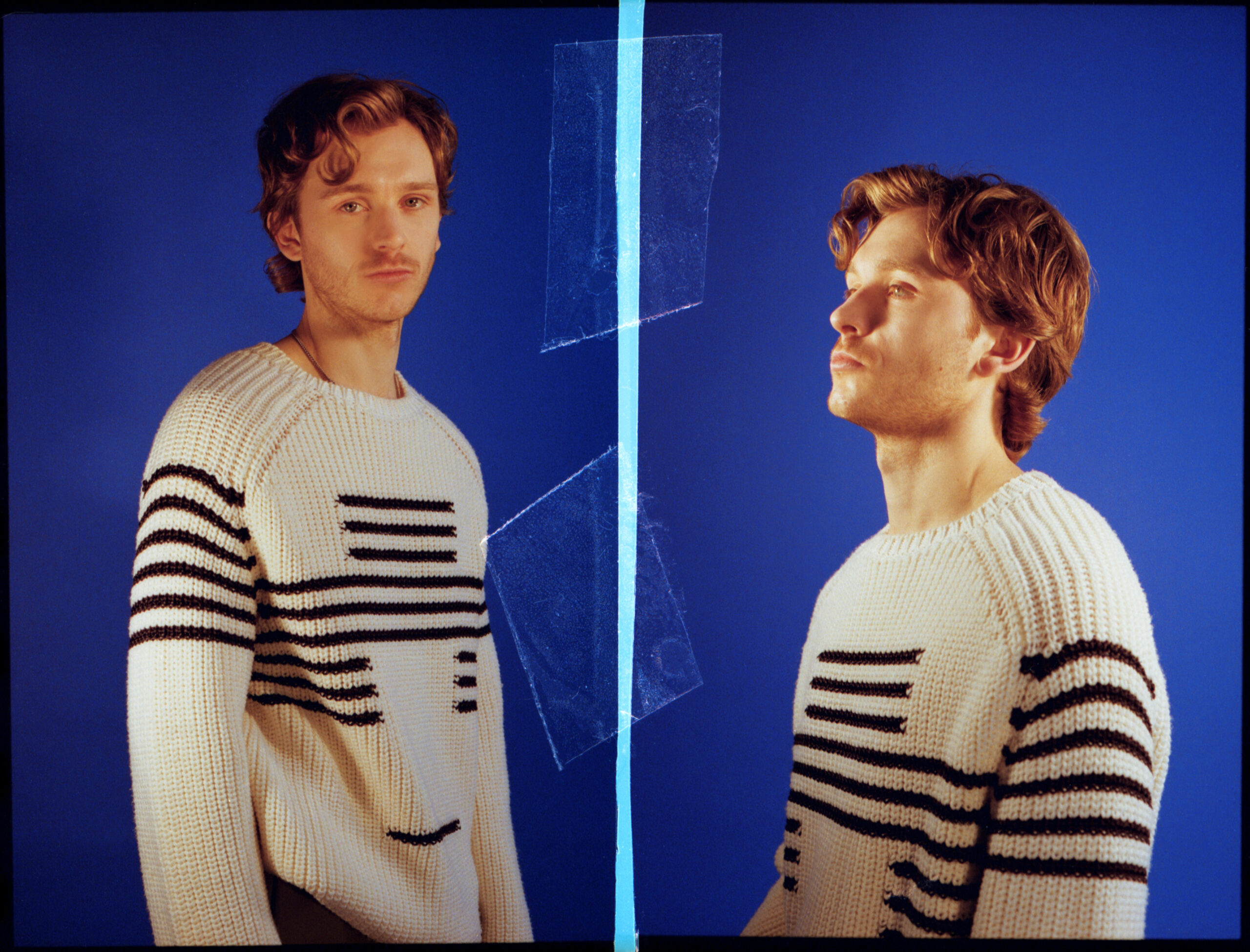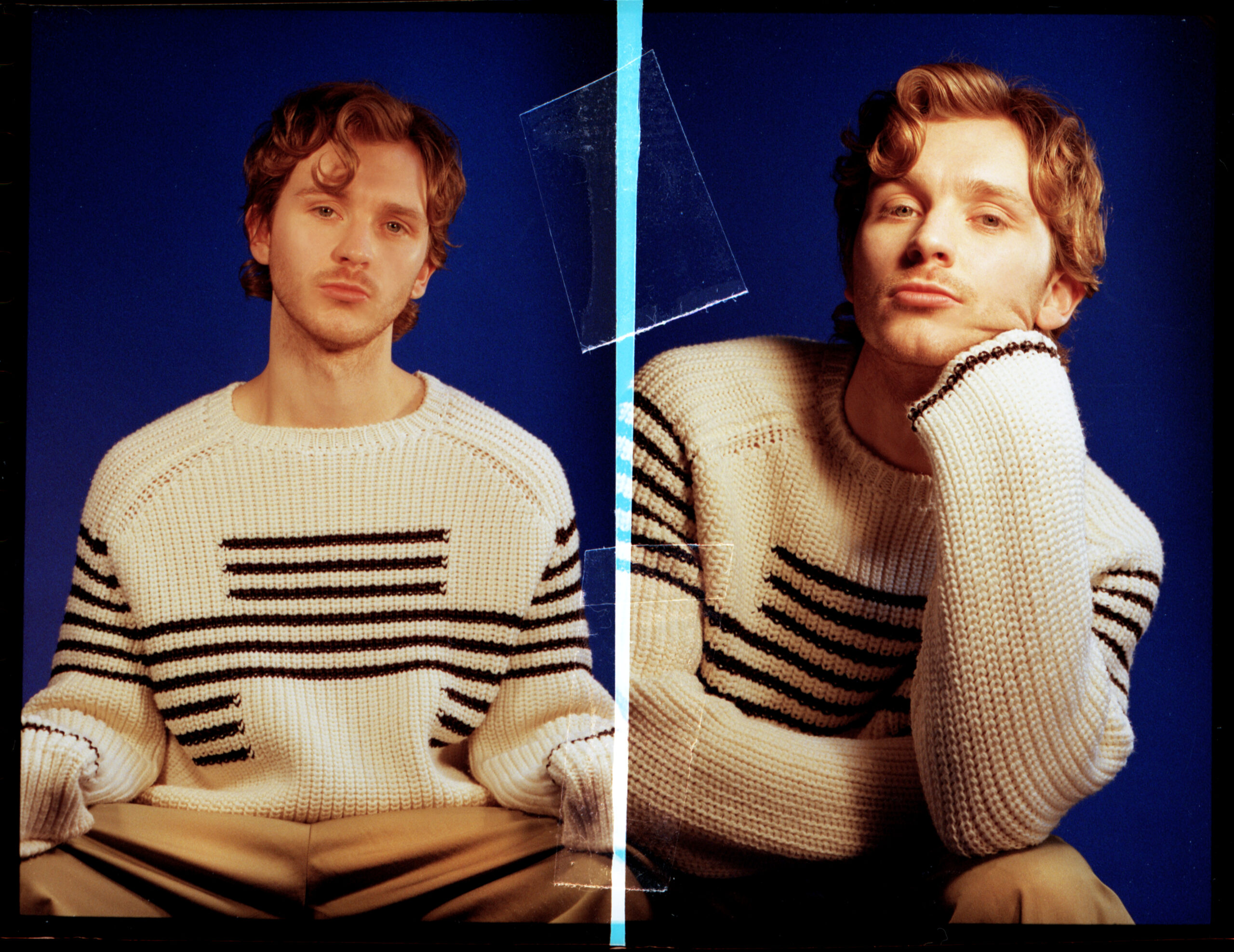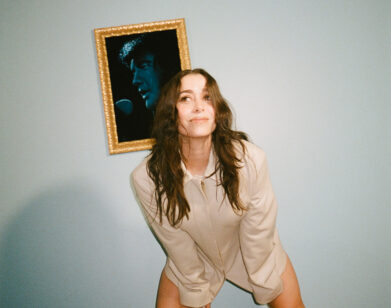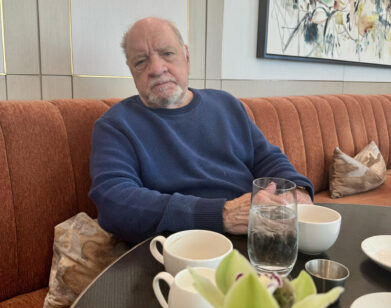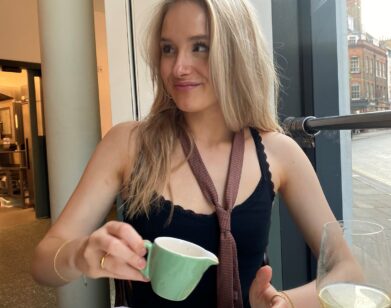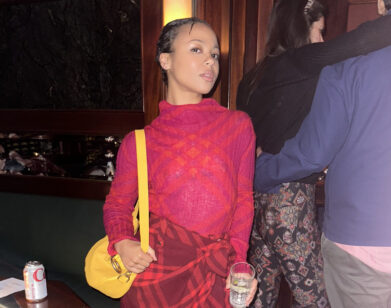IN CONVERSATION
Harry Lawtey Tells Myha’la Why He Feels Naked Without His Industry Suit
When the soapy British series Industry first premiered on HBO in the fall of 2020, it was largely overshadowed by the network’s two crown jewels, Succession and Euphoria, both of which earned the coveted Sunday night time slot. But the show, Mickey Down and Konrad Kay’s sleek, sexy, high-octane drama following the precocious upstarts at a cutthroat London investment bank, didn’t need much time to attract its own loyal following. Fast forward four years and it’s Industry, whose critically-acclaimed third season premiered last week, that’s airing on Sundays at 9pm (and whose cast now includes heartthrob and Game of Thrones vet Kit Harrington). To mark the show’s new and even more audacious season, we asked two of its standouts—Harry Lawtey (Robert) and Myha’la (Harper)—to hop on a Zoom call and tell us how the sauce gets made. Below, they Harry Potter, their beloved Cardiff, and why it can be empowering to do your own hair and makeup.
———
HARRY LAWTEY: Thanks for doing this, by the way.
MYHA’LA: Of course. Hi, baby. I watched the episode last night with everyone else. I know you haven’t seen it, but you’re really, really good.
LAWTEY: Thank you. That’s very sweet.
MYHA’LA: I want to start this by asking you, what questions do you wish that people who interview you would ask you?
LAWTEY: I knew I was going to get good ones from you. I don’t necessarily know how to answer that, but I like considered ones. I remember when I was at drama school, I used to spend a lot of my spare time watching clips of actors speaking about their work. This was before I’d ever done anything of any credibility, and I remember noting how they often would say, “Oh, that’s a really good question.” I wondered how much of that was just a faux politeness that you get from being a public figure. And now, I find myself saying that same thing occasionally, and I realize it’s just because you get asked a lot of the same questions.
MYHA’LA: You do.
LAWTEY: But every now and then you’ll speak to someone and it’s so clear that they’ve really committed themselves to your work for a period of time and tried their best to respond to it, which is what I really want. You want people to respond to the things that you make in whatever way that may be.
MYHA’LA: That’s right.
LAWTEY: Because that’s our duty as actors. I mean, that sounds a bit wanky.
MYHA’LA: Wank away, babes.
LAWTEY: I don’t think we have to change the world, but you should just try to create a response, whether that’s laughter or sadness or connection. An interviewer creating a dialogue is exciting and quite humbling. And if an interviewer asks a new question, it gives you the opportunity to say something new.
MYHA’LA: Woo-hoo.
LAWTEY: It’s like interview inception at this point.
MYHA’LA: Well, I feel the same way. They’re always like, “So what is it like?” And I’m like, “What is what like?” I hate those questions. My favorite interview was the one that Mando [Armando Rivera, Herrold’s husband] did with me. Because it felt like he was genuinely invested in my work and my aspirations.
LAWTEY: That was the one where you met?
MYHA’LA: Yeah, that’s the one where we met.
LAWTEY: A couple years and an engagement ring later, it seems like that went pretty well.
MYHA’LA: Enough about me. I was just thinking about how you said something like, “My first notable work.” Now I’m wondering about the work you don’t think is notable. Could you please tell us?
LAWTEY: Well, I don’t know how much attention I want to draw to it, but I worked as a child actor for a little bit.
MYHA’LA: You were in a notable series.
LAWTEY: Which one?
MYHA’LA: I guess it’s not a series, is it? What do you call Harry Potter?
LAWTEY: Oh, I was not in Harry Potter. That is not true.
MYHA’LA: You were, weren’t you?
LAWTEY: No, I was an SA in Harry.
MYHA’LA: That’s what I’m talking about. You were holding a ferret.
LAWTEY: A rat.
MYHA’LA:: Okay, a rat.
LAWTEY: My first ever experience on a set was with about 400 kids. I spent a couple of days being an SA on the final Harry Potter film in the final scene where they’re all grown up and their own kids are boarding the train to Hogwarts. But that’s not even what I was afraid to say, because I simply wouldn’t refer to that as part of my back catalog.
MYHA’LA: I would consider that one of your most iconic works.
LAWTEY: There is a funny story I’ve told you, which for the benefit of Interview I will bring up. I was on the platform with a load of other kids, and just before we were about to start rolling on the first take, the animal handler started to filter through all of the students and they started issuing all these animals in these little cages, the owls and whatnot. He comes straight up to the little group I was standing in and hands me a box that had a rat inside. And I was like, “Oh, great.” I don’t love rats personally, so that was brilliant. Then it took another half an hour before they even started rolling on the first take, so I was just holding this rat for half an hour and it didn’t smell great. I have nothing against rats on a fundamental level, but I didn’t really want to be holding it, so I was a bit miffed. Then one of my friends who was next to me, very generously and without any cynicism, said, “I can hold it if you want,” because he could see I was uncomfortable.
MYHA’LA: Oh no.
LAWTEY: So he took hold of the rat and I was like, “Thanks.” And quite literally a minute later they were like, “Guys, we’re going for the first shot.” And the first AD goes, “Who’s the kid with the rat?” He picks my friend who is now holding the rat and says, “Come with me,” takes him right to the front of the room and says, “When we start rolling, I want you to walk directly across the frame in front of the camera.” And he did that. He’s in the film. Obviously, I am not in the film, along with the other hundred kids. The moral of the story is to never give away a rat.
MYHA’LA: As New Yorkers, we know that. We love our rats. Okay, I haven’t seen it yet, but I would really like for you to talk about this project that you’ve just finished. I’m really, really excited to see this. I feel like this is going to be the biggest physical transformation that we will see from you. Is that true?
LAWTEY: Yeah, perhaps so.
MYHA’LA: Wait. First, I just want to quickly say that your voice in the Joker trailer is insane. Mando was like, “Did you hear this? It’s Harry.” And I said, “No, it’s not…”
LAWTEY: It was incredible, really. I’m still reeling from it because I literally wrapped two days ago. It’s a film called Mr. Burton, which is about the young life of Richard Burton and his very special connection with the person who later became his adoptive father, but was initially his school teacher, Philip Burton. That man introduced him to art and culture and acting and changed his voice, as well. He had a very strong, thick Port Talbot Welsh accent.
MYHA’LA: Welsh is maybe one of the most difficult accents to learn.
LAWTEY: He then went on to develop what was probably the most iconic voice of the 20th century. But this is about his young life, and I played him at 17 and over the course of a decade until 27. It felt like I was playing two characters to some extent, because I’m playing him with a decade in between. I had to think a lot about what physical changes you go through in that time, the way that you hold your frame and the way you express yourself. When you’re 17, you don’t fit in your body just yet, and your growth is accelerating a little faster than you can keep up with. There’s a very endearing, cumbersome way that you interact with the world. I was just trying to work out seeing the world from that perspective when you are in the maelstrom of discovering who you wish to be.
MYHA’LA: For sure. How many hours did you sleep?
LAWTEY: Oh, god. It was certainly the most intense, demanding job I’ve done. There’s a huge amount of responsibility and pressure. This person is an icon and such a beloved hero. He’s the quintessential working-class hero. To chart that journey authentically and deftly was a real challenge. And then towards the end of the film, I have to evoke him and feel like the person that everyone remembers and recognizes. Especially for my parents’ generation, he was probably one of the most famous movie stars in the world. So a lot of people have this really strong concept of him, but I can already tell it’s going to be one of the great privileges of my career. The team and the crew were just so wonderful, and I’ve never felt such kindness and goodwill from the people around me on a project. I just hope that we’ve made something worthwhile.
MYHA’LA: I’m sure that you have. The way you talk about this production feels different, and I can tell in your eyes and your voice and your body that you’re holding it so dear. I don’t think you take yourself seriously at all, but you take your work seriously, and that’s huge. I have so much respect for that.
LAWTEY: Thank you. That means a lot.
MYHA’LA: Of course. I guess we should talk about Industry. First, this production that you just talked about, where were you shooting it?
LAWTEY: In Cardiff, of course—the spiritual home of my career.
MYHA’LA: Which just so happens to be where we shoot Industry. And for all the fans who missed you dearly on the red carpet for our premiere, exactly where you were while we were in New York celebrating Industry?
LAWTEY: I unfortunately wasn’t able to make it to premiere, which was an incredible shame, because I was filming this project, and we were in our final week of the schedule, so it was very hectic. We were actually filming in the place where I lived when we did Industry. I always lived in a specific part of Cardiff called the Bay, and we were filming in the Bay, and on the way back home to where I was living on this project, we drove directly past the studio where we film Industry. Inside of which still stands, I imagine, the trading floor that is our home—
MYHA’LA: Dusty, crusty, abandoned.
LAWTEY: The ghosts of all of us are lurking about somewhere.
MYHA’LA: Literally.
LAWTEY: It was a strange way for things to happen, but it felt serendipitous.
MYHA’LA: Sure did. Had you been available, what would you have worn on the red carpet? Everyone really wants to know.
LAWTEY: Who knows, really? I imagine a suit. I think it’s partly a byproduct of the show that I feel so comfortable in a suit—
MYHA’LA: Do you?
LAWTEY: Very much so. I mean, the majority of my professional experience has been in suits, and I feel slightly naked on set sometimes without one. It has that useful element of seeming like armor, and sometimes you need a bit of that if you’re going to go on set for the day and try to be confident. It’s also hilarious because I became an actor so I never had to wear a suit and sit in an office all day long, and then this happened. I always like a suit with a tie as well, because I just think ties are nice, and probably also some kind of boot.
MYHA’LA: Wait, are we giving a little bit of a heel?
LAWTEY: Oh, we’ll give a heel. I like a flare and a boot these days.
MYHA’LA: 10 out of 10, would bang. Hall pass. Love it. You did your own hair for season three, right?
LAWTEY: I did.
MYHA’LA: I think that earns a shout-out because I was watching the episode last night, that scene with you and Kit when you’re like, “Has your luck turned for the better?” And he says “No,” which is really sad and depressing, but you turn your face out the window and smile and you look a bit like Bond. And by a bit, I mean a lot, the way your hair was swooped that way.
LAWTEY: It didn’t take a great deal of doing. Let’s not overcomplicate things. I’m no genius.
MYHA’LA: Fine.
LAWTEY: And someone who is a genius is our makeup designer, Mirna Curak. I was actually speaking to a colleague about this a couple of weeks ago who’s never done a long-running show. It’s the closest thing you can have in our profession to a social continuity with the way that you work. There are people who are on the show who have been with us since 2019. In the purest sense of the word, they’re like colleagues and friends. This profession is wonderful for all sorts of reasons, but you don’t get consistency and you live this nomadic lifestyle, which can be both joyful and comforting if you’re able to adapt to it. But what we have in this show is a home, and Mirna is one of the people who represents that. We’re very, very close. Genuinely, I wish more people asked about the crew. I wish more people asked about the designers, about the head of departments, about the cinematography, because when I think of the show, I think of you and those people.
MYHA’LA: Yeah.
LAWTEY: They’re entirely intrinsic to the show. Whatever people take in as an end product is built by them. We have the blessing and the curse of being the face of that, but it takes a village. We’ve been extraordinarily fortunate to have some pretty special villages over the last five years. Mirna was one of those. We spoke about the hair at the start. I want to make sure that my hair doesn’t take away from her work. She was very much on top of my hair, but I said, “Is it okay if I just do it before I come in?” Just because I think there are very few opportunities to feel autonomy as an actor.
MYHA’LA: I was going to say that.
LAWTEY: The sense of control that you have over what you’re doing often feels quite disconnected and sparse. To have the chance to try to claim some of that can make a real difference to your level of confidence in your work. Because ultimately, you’re going to give everything you have and then it will be taken away from you and made into something that is beyond your control. I heard this quote from this interview with Donald Sutherland recently where he was talking about Marlon Brando, who he knew very well, and he said, “I think it must be very trying when you’re that good and that exquisite, you put your body, yourself, your soul, your ideas in the hands of someone else and allow them to take it, cut it into little pieces, and create a character different from the character that you thought you were giving them. And you have to accept that. And if you accept that, then it’s an adult vocation.”
MYHA’LA: Dang.
LAWTEY: That’s what it is in a way. You accept the notion that ultimately you’re working in service of something that is beyond you. And I guess something as simple as putting your own hair product in your hair might help with that.
MYHA’LA: I mean, I feel the same way. Sometimes I’m like, “Can I do my mascara today?” ‘Cause sometimes I feel a bit like a child who’s actually not able to do anything, because everyone around you is like, “No, I’ll do it.” Which is their job. Like, they should take my mic off me, because what if I take it off and I break it and then there’s thousands of dollars—
LAWTEY: I don’t want to regress the further I go into this industry, which happens easily, mostly for practical reasons rather than any sense of privilege or luxury. A lot of things are done for you because they don’t trust you to do it yourself.
MYHA’LA: Of course.
LAWTEY: And if you just sit back and allow that to happen, rather than engage and collaborate, then you might just become useless and lose all sense of independence. This has always been my experience on Industry. I want to be in the team. I want everyone to be on the same side. And for me, that means asking questions and learning stuff. Everywhere you look is an expert in a field, a treasure trove of ideas and knowledge. I’ve always just wanted to learn more about it and, by proxy, get better at my part within that.
MYHA’LA: That was so beautifully said, and I am so grateful that I got to have a conversation with you this morning. I could have asked you some generic bullshit, but they’re going to watch the show and see how good you are. I’m very grateful for you. I love you a lot. This entire interview, I have been lovingly staring into the camera and swooning the whole time.
LAWTEY: You’re my hero. I love you to the end.

